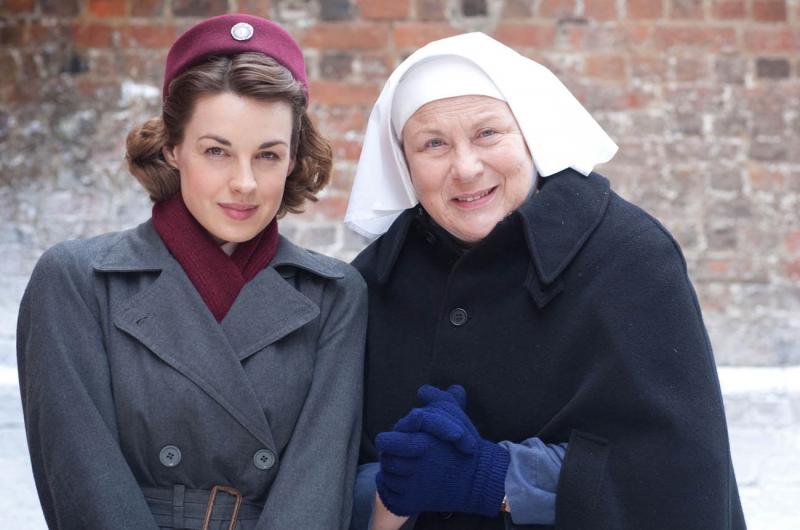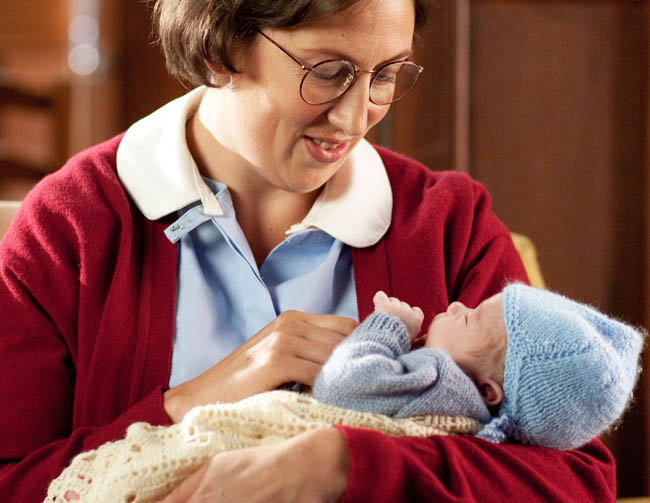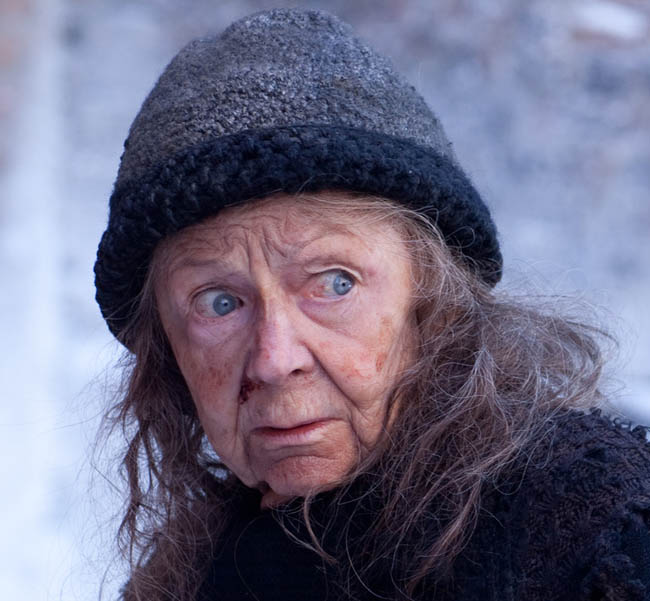Call The Midwife Christmas Special, BBC One | reviews, news & interviews
Call The Midwife Christmas Special, BBC One
Call The Midwife Christmas Special, BBC One
Our heroines return to battle poverty and squalor in the 1950s East End

You have to wonder whether blood, squalor, flea infestations, DIY childbirth and urine-soaked tenements are really the perfect family viewing elixir for 7.30pm on Christmas Day, but the BBC has obviously decided that it's good for us. Or, considering that the ornate and crenellated shadow of Downton looms so large over the festivities, maybe they felt they had no choice but to deploy the Midwife weapon, the Beeb's biggest drama hit in a decade.
If you could keep your lunch from launching itself across the carpet - the woman having her baby's head extracted from between her legs while she straddled the communal toilet in a block of decaying East End flats nearly did it for me, I must admit - this was a robustly built and sometimes tear-jerking story which picked up seamlessly from the first series. The cast have bedded in so comfortably that this didn't feel like a Christmas one-off, and in between the high moral seriousness of Sister Julienne (Jenny Agutter) and the hockey-sticks jollity of Chummy Noakes (Miranda Hart, pictured below), writer Heidi Thomas found space to strike a wide range of tones.
 The Nonnatus House nuns continued to shine, not least Sister Evangelina (Pam Ferris), who put on a startling display of musical farting. Jenny Lee (Jessica Raine) is becoming a more competent midwife but she can't shake off that permanently troubled expression. On the other hand Helen George's Trixie Franklin, the pert blonde one, never seems particularly concerned about anything, and always looks ready for a riotous night up west. PC Noakes, Chummy's husband (Ben Caplan), epitomises the popular myth of the cheerful community copper that people apparently believed in back in the late Fifties (we know he would never falsify his logbook, for example), and Dr Turner (Stephen McGann) fits in nicely as the caring medic who would never turn away a patient.
The Nonnatus House nuns continued to shine, not least Sister Evangelina (Pam Ferris), who put on a startling display of musical farting. Jenny Lee (Jessica Raine) is becoming a more competent midwife but she can't shake off that permanently troubled expression. On the other hand Helen George's Trixie Franklin, the pert blonde one, never seems particularly concerned about anything, and always looks ready for a riotous night up west. PC Noakes, Chummy's husband (Ben Caplan), epitomises the popular myth of the cheerful community copper that people apparently believed in back in the late Fifties (we know he would never falsify his logbook, for example), and Dr Turner (Stephen McGann) fits in nicely as the caring medic who would never turn away a patient.
Certainly this isn't a cliché-free zone, but the thing has soul and Thomas had packed in some strong plotlines. Chummy's preparations for the nativity play, as she tried to find props and costumes for the largely penniless local kids and had to surmount various disasters, provided some running light relief (in fact recruiting Hart to the cast was the best decision they made). Then there was the tale of a girl called Lynette, who'd got herself knocked up on an outing to Margate, and didn't dare tell her parents about her condition.
 She was reduced to having the baby alone in the dark, filthy room which was also home to Mrs Jenkins, a half-crazed derelict destroyed by her years in the workhouse (pictured left, played by Sheila Reid). The way the the nuns and midwives brought about a reconciliation between Lynette and her parents, and how Jenny ferreted out the history of Mrs Jenkins and her five children who'd died in the workhouse (one of them was said to have "failed to thrive"), provided most of the Kleenex-drenching moments, especially the scene where Mrs Jenkins knelt down on the patch of common graveyard beneath which lay her daughter Rosie.
She was reduced to having the baby alone in the dark, filthy room which was also home to Mrs Jenkins, a half-crazed derelict destroyed by her years in the workhouse (pictured left, played by Sheila Reid). The way the the nuns and midwives brought about a reconciliation between Lynette and her parents, and how Jenny ferreted out the history of Mrs Jenkins and her five children who'd died in the workhouse (one of them was said to have "failed to thrive"), provided most of the Kleenex-drenching moments, especially the scene where Mrs Jenkins knelt down on the patch of common graveyard beneath which lay her daughter Rosie.
As ever, I could have done without Vanessa Redgrave's quavering voiceover, and her concluding homily about love and faith felt particularly at odds with some of the horrors we'd witnessed. Like everybody else, I daresay, I flicked over to Downton with a sigh of relief.
Add comment
The future of Arts Journalism
You can stop theartsdesk.com closing!
We urgently need financing to survive. Our fundraising drive has thus far raised £49,000 but we need to reach £100,000 or we will be forced to close. Please contribute here: https://gofund.me/c3f6033d
And if you can forward this information to anyone who might assist, we’d be grateful.

Subscribe to theartsdesk.com
Thank you for continuing to read our work on theartsdesk.com. For unlimited access to every article in its entirety, including our archive of more than 15,000 pieces, we're asking for £5 per month or £40 per year. We feel it's a very good deal, and hope you do too.
To take a subscription now simply click here.
And if you're looking for that extra gift for a friend or family member, why not treat them to a theartsdesk.com gift subscription?
more TV
 Murder Before Evensong, Acorn TV review - death comes to the picturesque village of Champton
The Rev Richard Coles's sleuthing cleric hits the screen
Murder Before Evensong, Acorn TV review - death comes to the picturesque village of Champton
The Rev Richard Coles's sleuthing cleric hits the screen
 Black Rabbit, Netflix review - grime and punishment in New York City
Jude Law and Jason Bateman tread the thin line between love and hate
Black Rabbit, Netflix review - grime and punishment in New York City
Jude Law and Jason Bateman tread the thin line between love and hate
 The Hack, ITV review - plodding anatomy of twin UK scandals
Jack Thorne's skill can't disguise the bagginess of his double-headed material
The Hack, ITV review - plodding anatomy of twin UK scandals
Jack Thorne's skill can't disguise the bagginess of his double-headed material
 Slow Horses, Series 5, Apple TV+ review - terror, trauma and impeccable comic timing
Jackson Lamb's band of MI5 misfits continues to fascinate and amuse
Slow Horses, Series 5, Apple TV+ review - terror, trauma and impeccable comic timing
Jackson Lamb's band of MI5 misfits continues to fascinate and amuse
 Coldwater, ITV1 review - horror and black comedy in the Highlands
Superb cast lights up David Ireland's cunning thriller
Coldwater, ITV1 review - horror and black comedy in the Highlands
Superb cast lights up David Ireland's cunning thriller
 Blu-ray: The Sweeney - Series One
Influential and entertaining 1970s police drama, handsomely restored
Blu-ray: The Sweeney - Series One
Influential and entertaining 1970s police drama, handsomely restored
 I Fought the Law, ITVX review - how an 800-year-old law was challenged and changed
Sheridan Smith's raw performance dominates ITV's new docudrama about injustice
I Fought the Law, ITVX review - how an 800-year-old law was challenged and changed
Sheridan Smith's raw performance dominates ITV's new docudrama about injustice
 The Paper, Sky Max review - a spinoff of the US Office worth waiting 20 years for
Perfectly judged recycling of the original's key elements, with a star turn at its heart
The Paper, Sky Max review - a spinoff of the US Office worth waiting 20 years for
Perfectly judged recycling of the original's key elements, with a star turn at its heart
 The Guest, BBC One review - be careful what you wish for
A terrific Eve Myles stars in addictive Welsh mystery
The Guest, BBC One review - be careful what you wish for
A terrific Eve Myles stars in addictive Welsh mystery
 theartsdesk Q&A: Suranne Jones on 'Hostage', power pants and politics
The star and producer talks about taking on the role of Prime Minister, wearing high heels and living in the public eye
theartsdesk Q&A: Suranne Jones on 'Hostage', power pants and politics
The star and producer talks about taking on the role of Prime Minister, wearing high heels and living in the public eye
 King & Conqueror, BBC One review - not many kicks in 1066
Turgid medieval drama leaves viewers in the dark
King & Conqueror, BBC One review - not many kicks in 1066
Turgid medieval drama leaves viewers in the dark
 Hostage, Netflix review - entente not-too-cordiale
Suranne Jones and Julie Delpy cross swords in confused political drama
Hostage, Netflix review - entente not-too-cordiale
Suranne Jones and Julie Delpy cross swords in confused political drama

Comments
Britain is not made up of